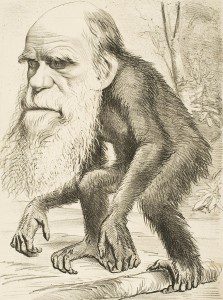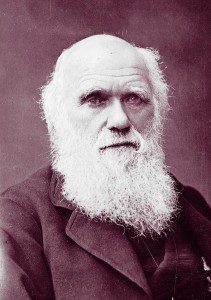
According to popular opinion among certain groups of creationists and Darwinians alike, Darwin devalued humanity and biblical religion. Is this view accurate?
Darwinian evolution teaches that humans developed from other, simpler life forms. In fact, all of life for Darwin has a common ancestry, possibly having emerged from some “warm little pond,” as he wrote in a letter to J.D. Hooker in 1871. Still, given that life has developed in increasingly complex ways over the ages, evolution does not put humans on the same level with gnats or apes. Regardless of what one believes about evolution as a theory, the theory does not equate humanity, or place it on the same level, with other life forms. For all the possible connections, the differences are more than nominal. Evolution does not stand still; rather, it proceeds generally toward greater complexity, advancing humanity beyond gnats and apes.[1]
One might argue that seeing greater complexity as an advance is a subjective value judgment. Perhaps that is the case, but if so, I take it to be likely a universal subjective value judgment (the act of ascribing value to natural processes would itself be a sign of human uniqueness in the evolutionary process). I cannot speak for what gnats or apes might think if given the ‘chance’ to be human (apart from King Louie in the animated Jungle Book), but I know of no human who would rather be a gnat or ape, though possibly a dog (As a child, and sometimes even as an adult, I wish I could have a dog’s life).
While Darwin may have been divided in his own subjective judgement of whether or not there is progress in evolution,[2] this should not come as too great a surprise. After all, progress does not always mean better—or better from every angle. For example, it is not always the smartest, or even the most virtuous people who win out according to evolution, but rather those who produce the most offspring that achieve adulthood and which also propagate.
Darwin saw senseless waste and suffering in nature, which led him eventually to question God’s providential involvement in what he took to be the evolutionary process. In addition to animals with useless appendages and those that experienced meaningless suffering, Darwin saw the death of his eleven year old daughter as senseless.[3] It was not specifically Darwin’s theory of evolution that led him to unbelief, but rather, the problem of evil, as he understood it. He could not swallow something akin to Leibniz’s best of all possible worlds theodicy.
It is not only the problem of evil that generates for some barriers for believing in a great and good creator. There is also the epistemological issue that progress in nature does not necessarily presuppose God. Apart from the subject matter of waste, the idea that there is progress of some kind and even purpose in nature does not prove the existence of a supreme and blessed designer, who oversees the process. Design in nature by itself does not “prove” the existence of the God of biblical theism. One can make a case that nature inherently operates by way of progress and advance, and that there are inherent codes within specimens and the environment that make nature tick, including its movement toward greater complexity at many turns.

While not a defense of the Judeo-Christian faith, is Darwinian evolution at fundamental odds with it (apart from Darwin’s eventual existential abandonment of belief in God)? For its own part, the Bible certainly ascribes progress and purpose to nature, as seen in Genesis 1. Moreover, the Bible sees humanity as vitally connected to the whole of creation. As with evolution, there is continuity. Humanity is part of the larger web of life. While it would be anachronistic to argue that the Bible teaches evolution or creationism as a renunciation to evolution, it does teach that we are formed of the dust of the ground (Genesis 2:7). Our distinctiveness is not one of radical separation from the rest of creation, but that God created humanity alone in his image (Genesis 1:26-27), and that God uniquely breathed spirit or the “breath of life” into man’s nostrils so that he became a “living soul” (Genesis 2:7). The Bible does not primarily address how God formed the world, but that God created, cultivates, and sustains it.[4]
Christian orthodoxy throughout the ages affirms some level of process and development among species. Fixity of species is not an age-old conviction. According to Ron Amundson, thinkers like Augustine, Aquinas and St. Basil rejected the notion that the various species were created during the first six days chronicled in Genesis 1.[5] It is worth noting that for Augustine, while God created all things at once, there is room for development or evolution, as with a dormant seed that develops or evolves later under God’s providential guidance. Moreover, Augustine did not believe the Genesis account should be taken literally at every turn in some rigid manner. For example, it does not provide a chronological order of the days; rather, the days are a “way of categorizing God’s work of creation,” according to Alister McGrath.[6] As far as the modern period is concerned, Darwin’s contemporary Harvard Botanist Asa Gray, a devout Christian, was one of Darwin’s chief supporters; the Princetonian theologian and biblical inerrantist B. B. Warfield is often cited as a proponent of a form of theistic evolution.[7]
Darwin never intended his views on nature to denounce religion or supersede or replace ethics. In fact, he believed one must bring the Bible or other sources to bear on developing ethics. In the “General Summary” in The Descent of Man, Darwin claims that as important as natural selection is, other agencies are still more important, such as “reasoning powers,” “instruction” and “religion,” for the cultivation of morality.[8]
The preceding reflections are taken to indicate that Darwin neither intended nor in effect devalued humanity and biblical religion, regardless of what one makes of his particular scientific theories. His views challenge certain interpretations of human value and biblical religion, to be sure, but not all of them. In fact, often the reactions to Darwin may tell us more about ourselves than about him at key points. While there are many legitimate concerns, it is worth asking: why do so many creationists and Darwinians alike go ape over Darwin? Is it because of his scientific research? Or is it bound up with ideological agendas that make more of Darwin than Darwin himself would desire? Is it bound up with a survival of the fittest impulse to champion their own tribe over others? If so, it is perhaps a return to an earlier stage in the human evolutionary process wherein might is right and morally ‘selfish genes’ trump civility.
[1]See Conor Cunningham, Darwin’s Pious Idea: Why the Ultra-Darwinists and Creationists Both Get It Wrong (Grand Rapids: William B. Eerdmans, 2010), pages 6-7.
[2]See Cunningham, Darwin’s Pious Idea, pages 138-139.
[3]Darwin also questioned the doctrine of God’s providential care in view of the doctrine of hell. Darwin could not imagine that his unbelieving father and brother as well as many friends, having died, would be banished to everlasting torment. See the following work for discussions of various contributing factors, which shaped Darwin’s views of God’s relation to the world and eventual loss of faith: C. Michael Patton, “The Reason Darwin Left the Faith;” https://www.reclaimingthemind.org/blog/2013/03/the-reason-darwin-left-the-faith/; see also Karl W. Giberson, How to Be a Christian and Believe in Evolution, with a foreword by Francis Collins (New York: HarperCollins, 2008).
[4]See Millard Erickson’s discussion of various ways biblically engaged Christians approach creation and evolution in Christian Theology, 3rd edition (Grand Rapids: Baker Academic, 2011), pages 442-456.
[5]See his work, The Changing Role of the Embryo in Evolutionary Thought: Roots of Evo-Devo (Cambridge: Cambridge University Press, 2005), page 35.
[6]See Alister McGrath, “Augustine’s Origin of Species: How the great theologian might weigh in on the Darwin debate,” Christianity Today, May 8, 2009; http://www.christianitytoday.com/ct/2009/may/22.39.html (accessed on 9/26/2015).
[7]See the following site for Darwin’s correspondence with Asa Gray: https://www.darwinproject.ac.uk/religion-historical-resources (accessed on 9/28/2015). David Livingstone and Mark Noll have argued that B. B. Warfield also affirmed at various points in his theological sojourn a form of theistic evolution: B. B. Warfield, Evolution, Science, and Scripture: Selected Writings (ed. David N. Livingstone and Mark A. Noll; Grand Rapids: Baker, 2000); David N. Livingstone and Mark A. Noll, “B. B. Warfield (1851-1921): A Biblical Inerrantist as Evolutionist,” Journal of Presbyterian History, 80 (2002): 153-171. As a counterpoint, Fred G. Zaspel has recently argued “the Livingstone-Noll thesis does not reflect the evidence.” What he means by this is that while Warfield was always cautiously open to interpreting scripture in a manner non-repugnant to evolutionary theory, this was only if evolutionary theory was proven true. But to its actual truth, he remained agnostic. See: Fred G. Zaspel, “B.B. Warfield on Creation and Evolution,” Themelios, vol. 35 no.2 (July 2010), available at http://themelios.thegospelcoalition.org/article/b.-b.-warfield-on-creation-and-evolution (accessed on 9/28/2015). Charles Hodge, a fellow Princetonian and Biblical inerrantist believed that evolution made sense, but not in the Darwinian fashion, which in Hodge’s mind undermined Paley-esque design. On this cf. David N. Livingstone, Darwin’s Forgotten Defenders: The Encounter Between Evangelical Theology and Evolutionary Thought (Grand Rapids: Eerdman’s Publishing, 1987), 100-105.
[8]See Charles Darwin, The Origin of Species by Means of Natural Selection or the Presentation of Favored Races in the Struggle for Life & The Descent of Man and Selection in Relation to Sex 6th ed. (New York: The Modern Library, 1872), pages 909-920.












